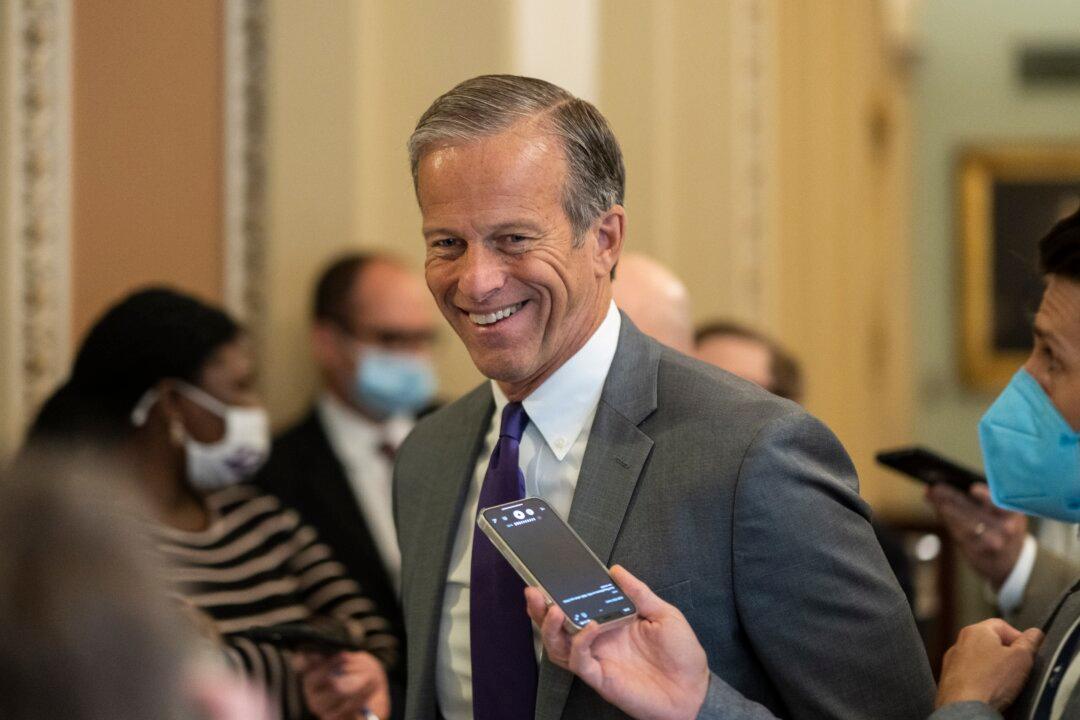SIOUX FALLS, South Dakota–Sen. John Thune (R-S.D.) won the Republican primary on his way to an all-but-assured fourth term in the U.S. Senate on June 7, beating out two ultra-conservative candidates.
With 48 percent of the votes reported at 10:42 p.m. ET on Tuesday, Thune received more than 73 percent of the vote, according to Decision Desk HQ.Thune, U.S. Senate Minority Whip, edged out two conservative Republican candidates, Bruce Whalen and Mark Mowry.
“I want to thank Republicans in South Dakota for supporting my Senate candidacy, and I look forward to continue putting South Dakota’s interests on the national agenda and stopping Biden’s radical, left-wing crusade,” Thune said in a prepared victory statement.Going into the June 7 primary, Thune has been a political fixture in South Dakota where he has held office since 1996. He won his first U.S. Senate term in 2004 where he ran unopposed.
A poll conducted by South Dakota State University’s School of American and Global Studies said Thune has solid support heading into the primary election.
The survey did not show that any incumbent had anything to worry about, David Wiltse a political scientist at SDSU said in an emailed statement.
“Their political style reflects that,” Wiltse said in the survey. “Right now, there’s this tension in the Republican Party between the more institutional types and the more populist types. At the moment, populists are edging out the more institutional types in most states.”
Both Thune’s opponents were critical of him because he did not support former president Donald Trump’s claims of an “unfair election” and question the election results.
Whalen, a member of the Oglala Sioux Tribe and a former ally of Thune, ran to the right of Thune and once said that Thune was a “porker” with taxpayer money. He said he parted ways with Thune over his criticisms of Trump. He warns of government handouts that he says, “created a culture of dependence and unemployment.”
“If you want to see what failed socialism is, come to an Indian reservation,” Whalen told reporters in a May 8 press conference. He continued by telling voters to heed his warnings about where the country is headed. He said that this was his “last bid for office.”
Mowry, touted a conservative pro-Second Amendment, pro-life, and pro-family message, while opposingo “bigger government.
Mowry was among skeptics who didn’t believe former President Donald Trump lost the 2020 election and decided to run against Thune because of his unwillingness to question the validity of the election results.
Mowry admitted that he went to Washington D.C. on Jan. 6 to protest President Joe Biden’s victory, but he maintained he did not participate in the demonstrations near Capitol Hill or the riots that broke out afterwards.
“It’s not something I’d normally do, because I don’t consider myself much of a political activist,” Mowry told reporters of his decision to head east in January. “But I was not in the Capitol. That’s a trespassing issue. And that never should have happened.”
Thune won his current Senate seat in 2004, when he made history by defeating a sitting Senate party leader for the first time in 52 years.
In 2010, he was elected to serve a second term in the Senate in a rare unopposed race. He was elected to a third term in 2016.
In November, Thune will face off against Democratic candidate, Brian Bengs and Libertarian Party nominee Tamara Lesnar.




